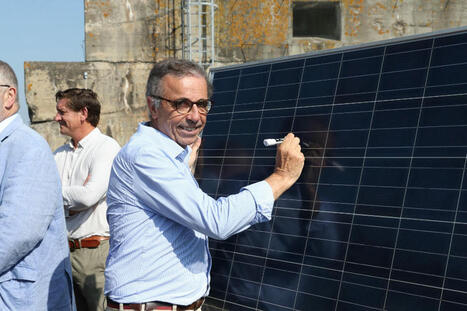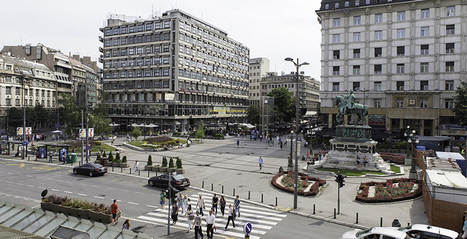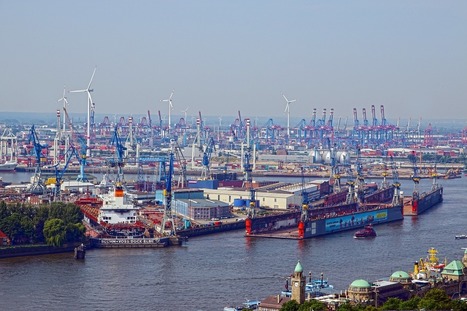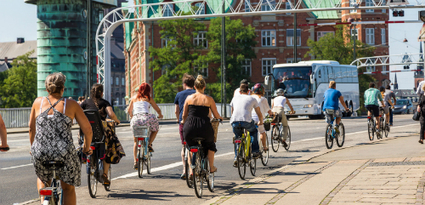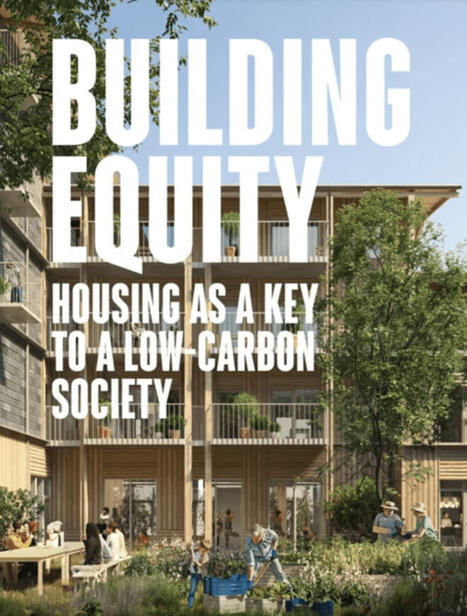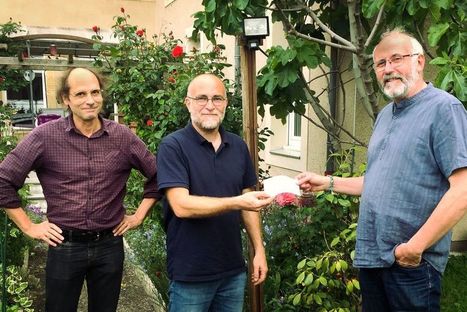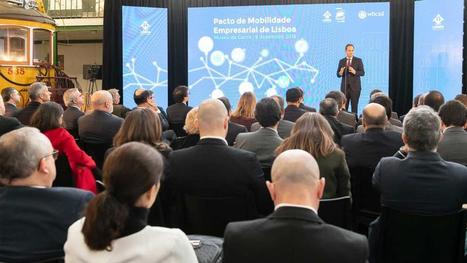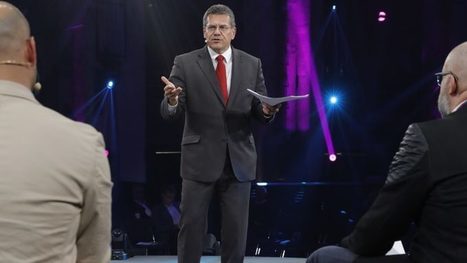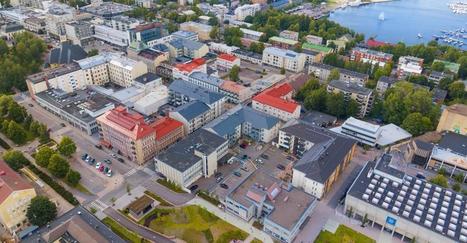 Your new post is loading...

|
Scooped by
Energy Cities
July 8, 7:13 AM
|
C’est un projet emblématique pour le maire écologiste de Bordeaux. Pierre Hurmic a symboliquement lancé, le 1er juillet, les travaux de solarisation de la base sous-marine et dressé le bilan de l’Alliance de Bordeaux pour l’énergie solaire un an après sa création. Elle réunit désormais 53 acteurs publics et privés qui se sont engagés à déployer du photovoltaïque sur le territoire bordelais.

|
Scooped by
Energy Cities
March 21, 4:19 AM
|
Amid an ever shifting political landscape, Polish municipalities offer unique insights into how democratic self-governance structures can ensure quality local public service provision. Following the end of communism, communities fought for transitioning from a highly centralised system to robust local ownership, withstanding the privatisation wave that swept the globe in the 1990s.Complementary to remunicipalisation debates, this article pulls out multiple creative ways in which Poland’s local authorities secure municipal service delivery, including intermunicipal collaboration (public-public partnerships), tendering in alliances to overcome private finance and autonomous local policy making to ensure services are in line with local needs.However, it remains an ongoing struggle to defend democratic municipal services against the threat of privatisation and authoritarianism.

|
Scooped by
Energy Cities
October 7, 2021 3:34 AM
|
The City Council of Sevilla has come to an agreement with company Emvisesa for the new affordable homes and they announced that 720 new rental homes have been signed off for the northern part of the city. New homes will be offered at below market rates and will also offer sports facilities on more than …

|
Scooped by
Energy Cities
January 21, 2021 5:08 AM
|
To create circular and fair business models, businesses and governments need to consider and address environmental, social, market and governance blindspots. This report dives into three specific business models within the textiles and electronics sectors—repair, resale and product-as-a-service (PaaS)—to map the potential side effects of circular business models and their value chains. Based on these insights, the report provides recommendations for businesses, policymakers, public procurers and civil society to ensure they can avoid blindspots and build business models that are not only circular, but also just and fair.

|
Scooped by
Energy Cities
October 21, 2020 9:04 AM
|
Depuis une quarantaine d'années, la financiarisation du capitalisme transforme les économies, les sociétés et les espaces urbains. Ce dossier interroge l'intervention croissante des acteurs, des instruments et des logiques de la finance dans la production urbaine, le rôle de la puissance publique et les conséquences sociales, politiques et spatiales de ces évolutions.

|
Scooped by
Energy Cities
June 29, 2020 11:30 AM
|
Energy service companies have been around for decades, working with municipalities to renovate public buildings such as schools, hospital and swimming pools in exchange for a guaranteed return on investment in the form of energy savings. With the EU's building renovation wave coming soon to your local town hall, has the time finally arrived for the energy services industry? In this special report, EURACTIV gives an overview of the challenges and opportunities facing the sector.

|
Scooped by
Energy Cities
December 26, 2019 12:08 PM
|
The speed at which we can stop using fossil fuels and decarbonize our energy – from how we heat our buildings to the ways we transport people and goods – will be key to avoiding the disastrous impacts of a warmer climate.
Around the world, forward-looking companies are rethinking their approach to purchasing and using energy. New technologies and business models show how a more efficient and low-carbon energy system is possible. But businesses need to act upon their new energy strategies fast if we are to deliver systems transformations at the speed we need.

|
Scooped by
Energy Cities
March 13, 2019 5:03 AM
|
The City of Belgrade will offer around 100 public building to investors to improve energy efficiency under ESCO projects, city representatives announced on World Energy Efficiency Day, adding that at the end of 2019 or at the beginning of 2020, the EUR 16 million Thermal Rehabilitation of Public Buildings project will be launched.

|
Scooped by
Energy Cities
October 15, 2018 4:20 AM
|
On September 22 2013, 50.9% of the Hamburg citizens voted in a referendum for the full remunicipalisation of the energy distribution grids in the city. The referendum was initiated by the citizen’s initiative ‘Our Hamburg – Our Grid’ (OHOG) and constituted the climax of an intense political controversy that lasted for more than three years. Through this vote Hamburg has received international attention and became a flagship example for remarkable civil engagement. In the international best-seller “This Changes Everything” (2014), Naomi Klein sees the driving motive in the people’s ‘desire for local power’. Indeed it is true that under the constitution of the City of Hamburg, a successful referendum has a binding effect, which left the City government no other option than to announce the implementation of the referendum decision and to start the remunicipalisation process immediately after the vote

|
Scooped by
Energy Cities
July 19, 2018 4:31 AM
|
Mieux vaut demander pardon que permission ! C’était la stratégie adoptée par Uber à ses débuts. Mais les villes comptent bien remettre de l'ordre dans la mobilité de demain.

|
Scooped by
Energy Cities
June 14, 2018 4:24 AM
|
The Smart Cities and Communities European Innovation Partnership aims at 300 smart cities by the end of 2019. The most difficult part: systems integration.

|
Scooped by
Energy Cities
March 22, 2018 5:29 AM
|
European Energy Innovation - spring 2018 publication

|
Scooped by
Energy Cities
January 16, 2018 1:00 PM
|
"We strongly believe in this project, because one of the most important challenges that cities have to face is the improvement of the quality of life. The objective is multiple and really ambitious: to reduce the energy bill, to reverse the gains of this decrease in improving the housing, and to boost the local economy among the people who are associated with the project. In addition, we want to promote among citizens the culture of energy saving, by providing them with tools to make this possible, and develop a local platform to integrate all local efforts in the way of energy transition”
Carles Ruiz, Mayor of Viladecans
|

|
Scooped by
Energy Cities
June 6, 6:11 AM
|
With many Europeans facing a cost-of-living crisis, access to healthy food options is dwindling. At a recent policy breakfast in the European Parliament, MEPs, and organizations representing restaurants, retailers and consumers exchanged best practices for facilitating access to decent and healthy food while reducing waste

|
Scooped by
Energy Cities
February 6, 9:39 AM
|
This in-depth report examines how housing can serve as a lever for both environmental and social equity, focusing on the crucial intersection of affordable housing and decarbonization.

|
Scooped by
Energy Cities
February 3, 2021 4:41 AM
|
This report explores the association between municipalities pursuing circular economy policy and investments in circular business that create jobs. Additionally, it takes a closer look at how businesses perceive this municipal support for the circular economy. The report summarises the findings of a study by Circle Economy and the Erasmus Happiness Economics Research Organisation with the support of the Goldschmeding Foundation.

|
Scooped by
Energy Cities
November 12, 2020 10:41 AM
|
Making European societies and economies more energy-efficient will play a key role in allowing the EU to meet its climate ambitions, create growth and improve well-being, particularly to meet the goal of making the EU carbon-neutral by 2050. Whilst energy efficiency has not always been considered as an attractive investment by the financial sector in the past, this CORDIS Results Pack features 10 EU-funded projects that have set a new dynamic for accelerating and upscaling private financing of energy efficiency investments across the EU, as well as making such investments much more attractive to investors.

|
Scooped by
Energy Cities
October 1, 2020 9:57 AM
|
En France, il existe 200 "Cigales". Ces clubs associatifs accompagnent et financent la création de petites entreprises dans le domaine de l’économie sociale et solidaire. A Metz, le club recherche de nouveaux membre

|
Scooped by
Energy Cities
December 26, 2019 12:11 PM
|
The World Business Council for Sustainable Development (WBCSD), Lisbon City Council, BCSD Portugal and 56 leading companies and institutions take an important step with the signing of the Corporate Mobility Pact (CMP). Stakeholders have committed to over 200 mobility actions to make mobility more sustainable in Lisbon .
This initiative is a response to the challenge of the Mayor of Lisbon, Fernando Medina, for whom “decarbonization presents itself as the greatest challenge of our generation. We need to reduce our emissions and make all types of transport more sustainable. Every day counts and every action is important. ”

|
Scooped by
Energy Cities
March 27, 2019 6:10 AM
|
Oslo, Rotterdam and Copenhagen are showing how cooperation with private sector actors is essential to reducing the carbon footprint of transport-related procurement activities.

|
Scooped by
Energy Cities
March 6, 2019 2:28 AM
|
This publication has been produced as part of the GEF 2018 transnational project Creating Socio-Ecological Societies through Urban Commons Transitions, with the support of the Institute of Political Ecology, Croatia.

|
Scooped by
Energy Cities
July 26, 2018 11:17 AM
|
The G20 is encouraging the public sector to improve oversight and management of public-private partnerships that are up and running.

|
Scooped by
Energy Cities
July 10, 2018 10:03 AM
|
Fostering local hi-tech success doesn’t have to mean offering huge tax breaks to companies like Apple and Amazon. Here are some alternative strategies

|
Scooped by
Energy Cities
June 5, 2018 10:16 AM
|
Public-private partnerships are vital to achieving the leap forward, deploying new clean technologies at scale and fast, writes Maroš Šefčovič.

|
Scooped by
Energy Cities
March 13, 2018 7:04 AM
|
“The City of Lappeenranta is committed to test and adapt circular economy technologies as well as business models. A mutual agenda with innovative companies helps us address environmental and economic issues simultaneously, for the benefit of Lappeenranta’s inhabitants. Urban Infra Revolution project is a great example, having truly global prospects for sustainable growth.”
Kimmo Jarva, Mayor of the City of Lappeenranta
|
 Your new post is loading...
Your new post is loading...




